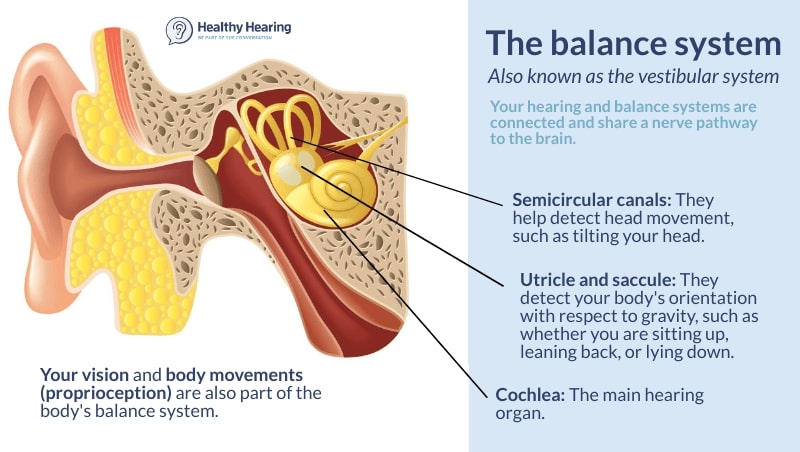|
www.HealthyHearing.com |
How balance and hearing are connected—and why it matters
Contributed by Madeleine Burry Walking and moving without falling or feeling dizzy are tasks you can accomplish thanks to your balance system. As with many systems in your body, when it’s functioning properly, it’s easy to take your balance for granted. Our balance system—also known as the vestibular system—is a complicated one. The brain relies primarily on information from three sources:
What is the vestibular system, anyway?The vestibular system helps us maintain our balance, orient ourselves in space, and navigate our environment, explained Jennifer Stone, PhD, a research professor of otolaryngology–head and neck surgery at the University of Washington. All of these functions, Stone said, mean that having it work properly is “crucial for our wellbeing.” It’s made up of five organs, each with a different function. “It's the integration of these five organs that's really important for how the vestibular system works," she said. That’s what tells the brain “how we are oriented in space and how we are moving." Balance organs in the inner ear
Balance problems are very common, especially as we age
get older. Whenever there’s a delicate process happening within your body, there’s potential for it to go awry. Statistics vary, but around 15 to 20 percent of American adults experience balance or dizziness problems every year, estimates show. This increases with age: A much-cited study in the Journal of Vestibular Research found that 35 percent of adults (age 40+) in the United States experience balance dysfunction. There’s a variety of reasons equilibrium issues are more common with age. For instance, some vestibular disorders are more common as we get older, according to Dr. Cameron Budenz, MD, medical director of the Audiology and Cochlear Implant Center at Phelps Hospital, Northwell Health in Sleepy Hollow, New York. With age also comes changes to vision or a potential loss of sensation to your legs and feet, she says. Dual sensory impairment—such as vision loss and hearing loss—also places extra stress on the balance system. Hearing and balance are both part of the inner earThe inner ear is the same part of the ear where the cochlea—the snail-like organ where soundwaves get converted into electrical impulses and transmitted to the brain—resides. The hearing system and the balance organs share a nerve pathway to the brain, known as the vestibulocochlear nerve. The connection between the hearing and vestibular system is direct, but there’s a division as well, Dr. Budenz notes. “One part is dedicated to hearing, another part to balance.” This means when something goes wrong in one, it can affect the other. If you are experiencing dizziness and hearing loss or ringing in the ears (tinnitus), it could be something wrong with your inner ear, for example. "People who have hearing loss are much more likely to have balance disorders than those who do not have hearing loss," Stone said, primarily because of this shared connection. The hearing and balance organs together are sometimes referred to as a labyrinth. In fact, when an infection affects both, it's known as labyrinthitis. Audiology testing can be useful for balance issuesDr. Budenz shares a helpful analogy for considering the connection between the hearing and balance systems: if you’re in a two-bedroom home, and there’s a fire, it could affect only one bedroom—but flames may very well cause issues throughout both rooms. “There are many disease processes that can affect both simultaneously because of the direct connection between the two,” Dr. Budenz says. That’s why if she’s evaluating a patient for dizziness and balance issues, she’ll also recommend a hearing test, which will provide insight. Audiologists, who often work with ENT doctors, can also perform balance tests, such as:
Conditions that affect both hearing and balance
Common balance disordersIf you have a balance disorder, you may experience a variety of symptoms, including dizziness, vertigo, feeling faint, falling (or feeling as though you will), and confusion. “If you have a vestibular disorder...the primary thing that you'll experience is a sense that something is horribly wrong,” researcher and clinician James Phillips, PhD, said during the HHF webinar. Beyond that, symptoms vary according to the particular cause, of which there are many, according to American Speech-Language-Hearing Association (ASHA), which lists more than twenty. Here are some of the most common balance disorders, according to the NIDCD:
More: Is your dizziness from labyrinthitis, BPPV or Meniere's? How to know When to see a doctorFeeling dizzy or experiencing vertigo aren’t a diagnosis—those are symptoms, Dr. Budenz points out. They’re a sign that something is awry. Through tests, a detailed patient history, and other diagnostic tools, health care providers can pinpoint the cause of these symptoms. It’s fine to start with your primary care doctor, Dr. Budenz says. Depending on the symptoms, they can determine next steps and an appropriate specialist. Lightheadedness might indicate it’s appropriate to visit the cardiologist to rule out blood pressure concerns, while headaches might point to migraines being an issue, making a neurologist the next visit, she says. If vertigo or balance issues are the main symptoms, an ear, nose, and throat (ENT) doctor is a reasonable starting point. Treatments vary depending on your condition, Dr. Budenz says. For most balance-related disorders, a treatment is available, although in some cases, the main goal may be to minimize symptoms. Madeleine Burry
|
Featured clinics near me
Earzlink Hearing Care - Reynoldsburg
7668 Slate Ridge Blvd
Reynoldsburg, OH 43068

Find a clinic
We have more hearing clinic reviews than any other site!



 Madeleine Burry is a Brooklyn-based freelance writer and editor. She's written about health for several online publications, including Women's Health, Prevention, Health, Livestrong and Good Housekeeping. You can follow her on Twitter @lovelanewest.
Madeleine Burry is a Brooklyn-based freelance writer and editor. She's written about health for several online publications, including Women's Health, Prevention, Health, Livestrong and Good Housekeeping. You can follow her on Twitter @lovelanewest.